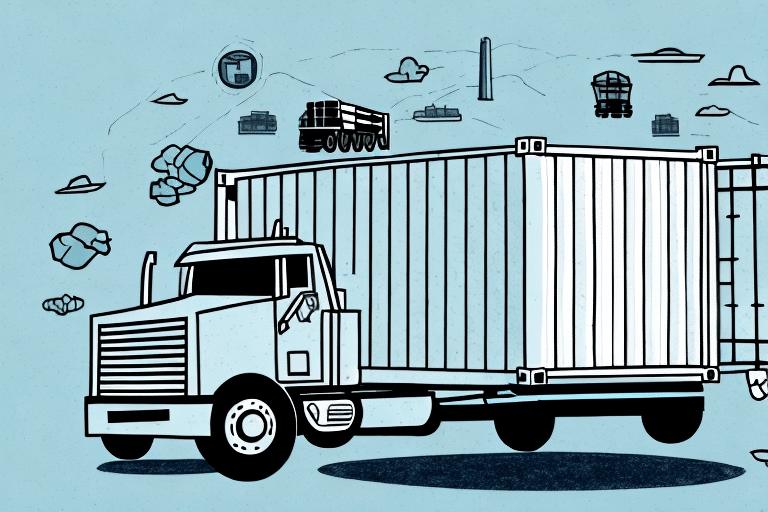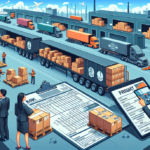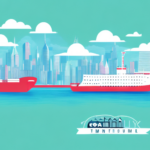What Is FTL Freight?
FTL freight, or Full Truckload freight, refers to the transportation of goods that occupy the entire capacity of a truck. This shipping method is ideal for large, bulky items or high-volume shipments that do not need to be consolidated with other loads. Unlike Less Than Truckload (LTL) shipping, which combines multiple shipments from different customers into one truck, FTL ensures that the entire truck is dedicated to a single shipment from origin to destination.
Understanding the Basics of FTL Freight
How FTL Freight Works
In FTL shipping, a single shipment fills up an entire trailer, which is then transported directly from the pickup location to the delivery destination without any stops in between. This direct route minimizes handling and reduces the risk of damage or loss.
Pricing Factors
FTL freight pricing is primarily based on the distance between pickup and delivery locations, the weight of the shipment, and the type of cargo. Additional services such as expedited shipping, specialized handling, or specific delivery time frames may incur extra fees. According to the Logistics Management, FTL rates can vary significantly based on fuel prices, demand, and regional factors.
Types of FTL Freight
Dry Van
Dry van trailers are enclosed and used for transporting a wide variety of goods. They offer protection from the elements and are suitable for non-perishable items.
Refrigerated (Reefer)
Reefer trailers are temperature-controlled units designed for transporting perishable goods such as food, pharmaceuticals, and other temperature-sensitive items.
Flatbed
Flatbed trailers are open and used for transporting oversized or irregularly shaped items like construction equipment, machinery, and building materials. They provide flexibility for loading and unloading on-site.
Specialized Equipment
Specialized trailers, such as lowboys and drop decks, are used for transporting exceptionally large or heavy items that require specific handling and support.
Benefits of FTL Freight for Your Business
Speed and Efficiency
FTL shipping typically offers faster transit times compared to LTL shipping because there are no additional stops or transfers. This is crucial for businesses that need timely deliveries to maintain their operations.
Enhanced Security
With FTL freight, the entire truck is dedicated to a single shipment, reducing the risk of theft or damage. This dedicated service ensures that goods are handled with care from pickup to delivery.
Cost-Effectiveness for Large Shipments
While FTL can be more expensive for smaller shipments, it becomes more cost-effective for larger loads. The cost per unit of freight decreases as the volume of the shipment increases, making it a viable option for businesses with high shipping volumes.
Environmental Benefits
FTL freight can be more environmentally friendly than multiple LTL shipments. By transporting larger quantities of goods in one trip, FTL reduces the number of trucks on the road, lowering carbon emissions and traffic congestion.
FTL vs. LTL Freight
Key Differences
- Shipment Size: FTL is ideal for large shipments, while LTL suits smaller loads.
- Cost: FTL may be more economical for high-volume shipments, whereas LTL is cost-effective for smaller loads.
- Transit Time: FTL generally offers faster delivery since there are no additional stops.
- Handling: FTL involves less handling, reducing the risk of damage.
When to Choose FTL Over LTL
Select FTL when transporting large, heavy, or high-value goods that require dedicated space and faster delivery times. If your shipment does not fill an entire truck, LTL might be a more cost-effective solution.
Choosing the Right FTL Carrier
Reliability and Experience
Select a carrier with a proven track record of reliability and extensive experience in handling FTL shipments. Experienced carriers are better equipped to manage various types of cargo and navigate potential challenges during transit.
Safety and Compliance
Ensure that the carrier adheres to safety standards and regulatory compliance. Check for proper licensing, certifications, and a strong safety record to minimize risks associated with transportation.
Service Offerings
Choose a carrier that offers a range of services tailored to your specific needs, such as real-time tracking, expedited shipping options, and specialized equipment for handling unique cargo types.
Coverage Area
Ensure that the carrier operates in the regions where you need to ship your goods. A carrier with a wide coverage area can provide more flexibility and better service options for your shipping requirements.
Customer Support
Good customer service is essential for smooth shipping operations. Select a carrier that offers responsive and helpful customer support to address any issues or concerns that may arise during transit.
Cost-Saving Tips for FTL Freight
Plan and Schedule Ahead
Scheduling shipments in advance can help you avoid expedited shipping fees and secure better rates. Early planning ensures that you have ample time to choose the most cost-effective shipping options.
Consolidate Shipments
Combining multiple shipments into one FTL load can significantly reduce overall shipping costs. Consolidation maximizes the use of truck capacity, lowering the cost per unit of freight.
Leverage Freight Brokers
Working with a freight broker can help you find competitive rates and the best carriers for your specific shipping needs. Brokers can negotiate on your behalf to secure favorable pricing and terms.
Optimize Load Planning
Efficiently planning and loading your shipments can minimize empty space in the truck, ensuring that you maximize the use of available capacity and reduce transportation costs.
Best Practices for Ensuring Safe and Secure FTL Freight Delivery
Select a Reputable Carrier
Partner with carriers that have strong safety records and comprehensive insurance coverage. A reputable carrier will prioritize the security and integrity of your shipments.
Proper Packaging
Ensure that your goods are properly packaged to withstand the rigors of transportation. Use durable materials and secure packaging methods to prevent damage during transit.
Use Technology for Tracking
Implement real-time tracking and monitoring systems to keep an eye on your shipment's progress. Technology enables you to respond quickly to any issues that may arise during transportation.
Comprehensive Insurance
Invest in additional insurance coverage to protect your goods against potential loss or damage. Adequate insurance provides peace of mind and financial protection for your shipments.
The Future of FTL Freight in the Shipping Industry
Technological Advancements
Emerging technologies such as IoT devices, AI-driven logistics platforms, and autonomous trucks are revolutionizing FTL freight. These innovations enhance efficiency, improve tracking accuracy, and reduce operational costs.
Sustainability Initiatives
The shipping industry is increasingly focusing on sustainability. FTL carriers are adopting greener practices, such as using fuel-efficient vehicles and optimizing routes to minimize their environmental impact.
Growth in E-Commerce
The rise of e-commerce continues to drive demand for reliable and efficient FTL services. As online shopping grows, businesses require robust shipping solutions to handle increased order volumes and ensure timely deliveries.
Regulatory Changes
Changes in transportation regulations and compliance standards will shape the future of FTL freight. Carriers and shippers must stay informed about new laws and adjust their operations accordingly to maintain compliance and avoid penalties.
Key Considerations When Selecting an FTL Freight Service Provider
Assessing Carrier Capabilities
Evaluate the carrier’s fleet, equipment options, and ability to handle your specific type of cargo. Ensure they have the necessary resources to meet your shipping requirements efficiently.
Evaluating Cost Structures
Understand the carrier’s pricing model, including base rates, additional fees, and potential discounts for regular shipments. Transparent pricing helps in budgeting and avoiding unexpected costs.
Reviewing Customer Feedback
Check reviews and testimonials from other customers to gauge the carrier’s reliability, customer service quality, and overall performance. Positive feedback is a good indicator of a dependable service provider.
Ensuring Clear Communication
Effective communication is crucial for successful shipping operations. Choose a carrier that offers clear and consistent communication channels to keep you informed throughout the shipping process.
Pros and Cons of Using FTL Freight for Your Business
Advantages
- Speed: Faster delivery times due to direct transportation.
- Security: Reduced risk of theft and damage with dedicated truck space.
- Cost Efficiency: Lower cost per unit for large shipments.
- Environmental Impact: Fewer trucks on the road can lead to reduced emissions.
Disadvantages
- Cost for Smaller Shipments: Can be more expensive for low-volume shipments.
- Flexibility: Less flexibility in shipment sizes compared to LTL.
- Higher Minimums: Requires a minimum volume to fill the entire truck.
Understanding the Role of Technology in Modern FTL Freight Transport
Real-Time Tracking
Advanced tracking systems provide real-time visibility into the location and status of your shipments. This transparency helps businesses manage their supply chains more effectively and respond swiftly to any disruptions.
Automated Logistics Platforms
Automated platforms streamline the booking, scheduling, and management of FTL shipments. These systems enhance efficiency, reduce manual errors, and provide valuable data analytics for better decision-making.
Enhanced Communication Tools
Modern communication tools facilitate seamless interaction between shippers, carriers, and receivers. Enhanced communication ensures that all parties are informed and can collaborate effectively to address any issues that arise.
How to Negotiate Better Rates with Your FTL Carrier
Research and Compare Rates
Conduct thorough research and compare rates from multiple carriers to understand the market standards. This knowledge positions you better during negotiations and helps you secure competitive pricing.
Leverage Volume Discounts
If your business ships regularly, negotiate volume discounts with your carrier. Committing to a certain volume of shipments can result in lower rates and additional perks.
Optimize Shipment Scheduling
Flexibility in scheduling can lead to cost savings. For example, opting for standard delivery times instead of expedited services can reduce shipping costs.
Build Strong Relationships
Establishing a strong relationship with your carrier can lead to better rates and personalized service. Trust and reliability are key factors in successful negotiations.
Utilize a Freight Broker
Freight brokers can negotiate on your behalf, leveraging their industry connections and expertise to find the best rates and service terms for your specific needs.






















